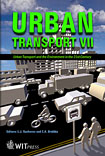Reducing Fuel Consumption And Emissions In Urban Areas By Using A New Fuel-efficiency Support Tool
Price
Free (open access)
Transaction
Volume
52
Pages
10
Published
2001
Size
1,095 kb
Paper DOI
10.2495/UT010591
Copyright
WIT Press
Author(s)
M.C. van der Voort & M.F.A.M. van Maarseveen
Abstract
Road transport still depends almost entirely on liquid fuels derived from natural oil. Combustion of these carbon-based fuels naturally results in the emission of carbon monoxide and dioxide, which play an important role in global warming. Improving fuel-efficiency through a change in driver behaviour can effectively reduce fuel consumption and corresponding emissions. Since fuel consumption is most substantial in urban areas, the largest gain is likely to be obtained here. A new-generation fuel-efficiency support tool has been designed that aims at reducing fuel consumption by inducing a change in driver behaviour. The support tool includes a normative model that formulates optimal driver behaviour in this respect based on the context the vehicl
Keywords





